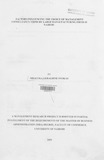| dc.description.abstract | Clients engage consultants for many reasons, not always successfully. Management
consulting has been used by firms to solve the many challenges being faced due to
globalization, new technologies and the competitiveness required to operate in such a
context. Many authors have noted that, despite the significance and size of the industry,
there does not seem to be correspondingly large wealth of empirical data on the practice
of management consulting and more so to their selection criteria.
The primary intent of the study was to examine the factors influencing the choice of
management consultancies among the manufacturing sector in Nairobi. A second purpose
was to identify the challenges faced in the selection criteria. This was achieved through a
descriptive study on the large manufacturing firms. A pilot survey was conducted through
interview in order to confirm their use of management consultacy services hence
forming the population of study. A structured questionnaire with likert type of questions
was administered to respondents through "drop and pick" later basis then analyzed using
both frequencies and descriptive statistics.
The study found out that both external and internal factors are considered in the selection
criteria. The factors commonly considered included expertise, experience pricing and the
reputation of the consulting firm. Although marketing is noted in the literature as a main
aspect for consideration in selecting management consultancies, substantial difference to
significant to advertising and personnel selling was evidenced from the study. This could
be attributed to image and reputation disparity to professional services.
The internal factors to selection criteria considered to great extend included the firms'
expectations and perceptions, past experience and clients engagement and control. A
consulting engagement is considered successful if the client is satisfied that the consultant
has met expectations and the consultant is satisfied that his/her reputation has been
enhanced, with expectations of future revenue streams. Further consultant competence
was evidenced, as a key factor to selecting a consulting firm hence consultants needs the
understanding for targeting market successfully. The challenges to the selection criteria
are discussed as consultancy services are almost universally offered. The selection for
specific firms to conform to a firms expectations and perceptions is critical, price
inhibition, value evaluation and lack of general competence are highly encountered in the
selection criteria.
The research recommended that for policy and practice in management consulting, joint
ventures between foreign and locally owned firms is necessary to facilitation of
technology transfer and technical training. The country could also find it necessary to
commit some areas of consultancy services in which capacity is insufficient under certain
articles of General Agreement for Trade in Services (GATS) Kenya. The limited demand
for consultancy services owing to Kenya's small economy, inadequate funding for
research, education and training that is to keep pace with information technology,
improved educational requirements for entry to the profession in comparison to world
standards is necessary for dissemination of competence in consultancy services. | en |

